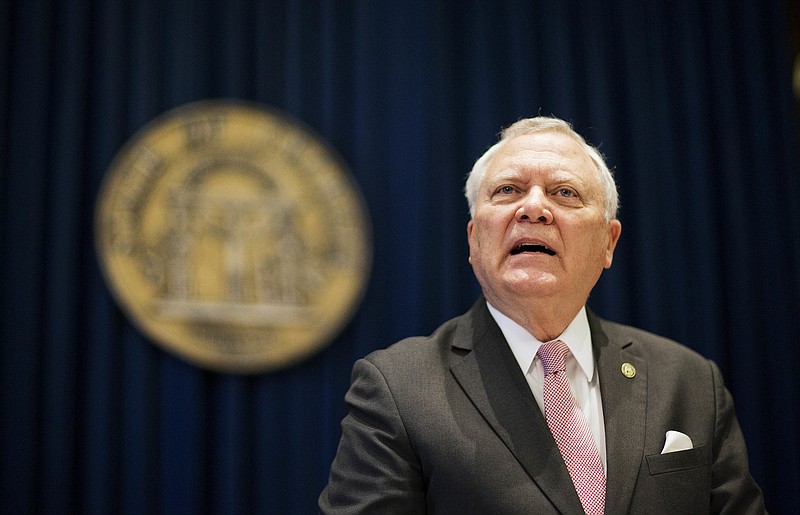ATLANTA (AP) - Tuesday's presidential results and Georgians' rejection of a proposed amendment to the state constitution are already having an effect on the upcoming legislative session.
Health care and education issues were expected to dominate 2017 at the Capitol.
But after President-elect Donald Trump's victory, key policymakers say discussions about expanding Medicaid in Georgia are likely on hold. Trump and the GOP-controlled Congress have vowed to repeal President Barack Obama's signature health care law, which created the expansion option for states.
Georgians on Tuesday rejected Gov. Nathan Deal's proposed constitutional amendment to allow the state to take over chronically low-performing schools. Deal, a Republican entering the second half of his final term in office, said his office is now considering other options.
Lawmakers don't reconvene until January, but here's an early look at Tuesday's significant effects at the state Capitol:
___
HEALTH CARE
Prior to the election, some Georgia Republicans suggested for the first time that they would consider expanding Medicaid under the Affordable Care Act. But Trump's victory on Tuesday throws the existence of President Barack Obama's signature law into limbo and likely nixed any expansion talks in Georgia.
State Sen. Renee Unterman, chair of the Senate's health committee, was among the Republicans open to considering Medicaid changes. But this week, she said any talks about expanding coverage should wait.
"We don't have a choice," Unterman said. "We know the system's going to change."
House Speaker David Ralston this week said the president-elect and new Congress will shape Georgia's next steps. Gov. Nathan Deal, also a Republican, said he'd like Trump and congressional Republicans to consider making Medicaid a block-grant program. Deal argued that would let the state make decisions about eligibility and other factors.
Unterman said she's hopeful that House Budget Committee Chairman Tom Price, a Republican congressman from Roswell, will convince Congress to take a "slow, methodical and steady" approach to any health care changes and consider the effect on hospitals and consumers in Georgia and elsewhere.
The influential Georgia Chamber of Commerce this year developed some possible expansion models that the GOP-controlled Legislature could support. Brian Robinson, a spokesman for the effort, said leaders still hope to find a way to extend coverage to more people and help protect the state's struggling rural hospitals.
"The task force isn't wedded to any particular federal policy; we're simply committed to addressing a serious problem," Robinson said. "If there are changes to federal law, it could perhaps allow for even more flexibility and cost-saving reforms."
Supporters of Obama's package in Georgia say they will highlight people who have gained insurance coverage under the law and others who gained coverage thanks to its ban on denying coverage due to pre-existing health conditions.
"It's a time of uncertainty," said Cindy Zeldin, director of advocacy group Georgians for a Healthy Future. "We can't go back. It would be devastating to consumers, to our economy and to our health system."
___
EDUCATION
Deal vowed to continue his second-term focus on education despite nearly 60 percent of voters on Tuesday rejecting a constitutional amendment he backed. The proposal would have allowed the state to take over a number of routinely low-performing schools.
The amendment was Deal's top legislative priority in 2016, and the governor delayed a larger push to overhaul the state's complicated formula for funding schools to focus on it.
Deal wasn't specific this week about his future steps, saying his staff is reviewing options. In the meantime, he said, local school district officials who opposed a state takeover are on the hook for making improvements.
"We're not going to give up," Deal said. "If there's a better answer, we will certainly be willing to embrace it. But the opposition in this proposition has had no other answers. They have provided no other solutions."
According to unofficial results, the amendment received more yes votes than no votes in only seven counties. Deal's allies used a political group not legally required to disclose donors to raise money but got outspent.
Louis Elrod, who led the anti-amendment campaign, said he expects the teacher and parent organizations involved will be prepared to respond to any proposals that Deal puts forward this year.
"This constituency of parents and teachers has a voice, and it's a very loud voice," Elrod said.
Verdaillia Turner, president of the Georgia Federation of Teachers, said the amendment's defeat sent a message "that we can no longer pander to political agendas." Turner also said Deal should meet with educator groups before the legislative session.
Deal hinted that he will resume efforts to overhaul the state's system for funding schools and other education policies, developed by an appointed Education Reform Commission. After backlash from teachers and some prominent Republican lawmakers to the recommendations, Deal put off a legislative push and formed an advisory committee of teachers to further weigh in.
"It's still premature," Deal said this week of funding changes. "Wait until we get to the legislative session, and we'll see what the legislation looks like."
